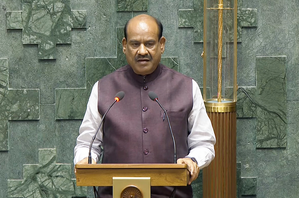New Delhi: Soon after his election as Lok Sabha Speaker, Om Birla Wednesday set off a firestorm by reading out a resolution condemning the imposition of Emergency as an attack on the Constitution by the then prime minister Indira Gandhi, an act that triggered vociferous protests by Congress member in the House.
Birla recalled that it was June 26, 1975, that the country woke up to the cruel realities of Emergency when the Congress government jailed opposition leaders, imposed many restrictions on the media and also curbed the autonomy of the judiciary.
“As we enter the 50th year of the Emergency, this 18th Lok Sabha reiterates its commitment to uphold, protect and preserve the Constitution built by Babasaheb Ambedkar,” he said as opposition members, mostly from the Congress, were on their feet, raising slogans against the reference to Emergency.
Prime Minister Narendra Modi welcomed the Speaker’s reference to Emergency in the Lok Sabha and said it was important for the youths as the period was a “fitting example of what happens when the Constitution is trampled over, public opinion is stifled and institutions are destroyed”.
“The happenings during the Emergency exemplified what a dictatorship looks like,” Modi said.
While Congress members raised slogans against the reference to Emergency in the Lok Sabha, BJP MPs gathered in huge numbers in the footsteps of the Parliament building to protest against the suspension of civil liberties 49 years ago.
“India has always promoted democratic values and the spirit of discussion and debate. Democratic values have always been protected, they have always been encouraged. Such an India was subjected to dictatorship by Indira Gandhi, India’s democratic values were crushed and freedom of expression was stifled,” Birla said in the resolution.
“This House strongly condemns the decision to impose Emergency in 1975. We appreciate the determination of all those people who opposed the Emergency, fought and fulfilled the responsibility of protecting India’s democracy,” he said amid vociferous protests by opposition parties.
“June 25, 1975 will always be known as a black chapter in the history of India. On this day, then Prime Minister Indira Gandhi imposed Emergency in the country and attacked the Constitution made by Babasaheb Ambedkar,” the speaker said.
“Those were the times when opposition leaders were jailed, the entire nation was turned into a prison. The then dictatorial government had put several restrictions on the media and there was a restraint on the autonomy of judiciary,” Birla said.
He said Indira Gandhi also talked about committed bureaucracy and committed judiciary, which was an example of her anti-democratic attitude.
The Emergency brought with it terrible antisocial and dictatorial policies that destroyed the lives of the poor, the Dalits and the deprived, he said.
“During the Emergency, people had to suffer the brunt of compulsory sterilization imposed by the Congress government, arbitrariness in the name of removing encroachment in cities and the evil policies of the government. This House would like to express its condolences to all those people,” Birla said.
PTI







































